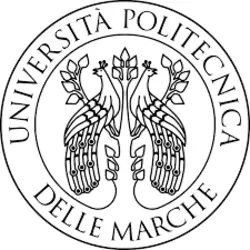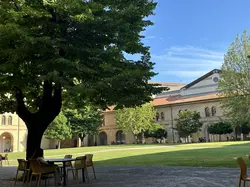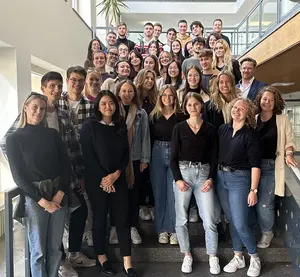Laurea Magistrale (Master’s level degree) in International Economics and Commerce
The "Faculty of Economics and Commerce" was originally set up in Ancona in 1959 as a branch of the University of Urbino, which dates back to the late medieval period. The new Faculty soon achieved national renown on account of its innovative study programmes, the quality of its teaching staff, mostly brilliant young professors from the more established National Universities and the wide scope of if its research endeavours. Paramount in the development of the new Faculty was Prof. Giorgio Fuà, a young economist who had worked with Gunnar Myrdal at the UN and later with Enrico Mattei at ENI (the state owned petroleum company). A native of Ancona, Prof. Fuà decided to come back to his hometown, to devote his intellectual and organisational abilities to the forwarding of the newly established Faculty. Under his guidance and that of other brilliant researchers grew a new generation of resident scholars.
After successful completion of the programme, you will be awarded the following degree by the School of Economics and Management of the Università Politecnica delle Marche
and for the Faculty of Social and Economic Sciences at the University of Bamberg the
- Master of Science in European Economic Studies
IEC is a Master for graduate students who are eager to develop their professional experience in an international context. Enrolling in this course will give you the opportunity to learn about the working of Italian SMEs specialised in the production of high quality,"Italian style" goods exported throughout the world. It is especially designed for students who are eager to develop their professional experience in an international context and are specifically interested in:
- Economic and financial institutions;
- Multinational enterprises or firms with a strong presence in international markets;
- International Organizations;
- Consulting firms that target the development of European and World markets;
The course is directed at students who have a good knowledge of English and for those with a keen interest in team work.
Students starting the programme in Bamberg (Bamberg = home institution)
Application and Admission
Admission to double degree programmes in Bamberg (home institution) is only possible for the winter semester. The application for double degree programmes is made as part of the application for the Master's degree programme in European Economic Studies and is integrated into the online application for the degree programme during the application phase. Unfortunately, we cannot accept applications from students who are already enrolled on the Master's programme. Further information about the online application procedure and the admission requirements can be found here:
>>>Application for a Master´s degree
Please note the shorter application deadlines for the double degree programmes: Applications for the winter semester 2025/26 will be possible from mid-May when the online portal for Master's applications opens. The application deadline ends on
22.06.2025
In addition to the regular application documents, you must submit the following:
- Letter of motivation in German
- Curriculum vitae
- Proof of language skills (B2 in English)
At the time of application, in addition to the usual recognised language certificates, school or university certificates, for example, are also accepted. For registration at the partner university, which takes place in the first semester (usually at the end of November), an official and up-to-date language certificate must then be provided. The registration for the second year at the partner university as well as the examination for an Erasmus scholarship is organised by the International Office of the University of Bamberg during the first semester. The following language certificates are currently accepted by the International Office:
- TOEFL ibT with at least 80 points
- IELTS Academic with at least 6.5 points
- Cambridge First Certificate (FCE), level B2
- Cambridge Certificate in Advanced English (CAE), level C1
- Cambridge Certificate of Proficiency in English (CPE), level C2
- In addition, the free language test of the Bamberg Language Centre with a result of at least B2 is accepted.
Knowledge of Italian is not mandatory, but is considered desirable. Students who would like to build up their Italian language skills in the first year are recommended to attend the specialised language training at the Language Centre of the University of Bamberg:
>>>Information on the language training at the language center of the University of Bamberg
Please refer to the study and examination regulations for the requirements for participation in the Master's programme in European Economic Studies.
>>>Study and examination regulation
>>>Further information on the degree programme and admission
Admission to a double degree programme at the University of Bamberg is usually only provisional until admission is granted by the partner university. Admission can only be granted during the first year in Bamberg, as it is dependent on other criteria (study progress, language tests, etc.).
If you receive a letter of admission for one of the Master's degree programmes, but no place on a double degree programme, your admission to the regular Master's degree programme remains valid. You will then still have the opportunity to apply for a regular study abroad programme.
After selection by the home university and receipt of the letter of admission from the partner university, students are admitted to the double degree programme. Admission by the partner university is usually a formality and does not require a separate selection procedure. Applications for the double degree programme that are sent directly to a partner university will not be accepted.
Students starting the programme in Ancona (Università Politecnica delle Marche = home institution)
Admission to the second year of study
If you started your studies at the University of Verona (as your home university) and come to Bamberg for your second year of study, you will have to go through a simplified admission process. This begins with you being nominated by your home university. You will then receive all the information you need from the International Office (IO) of the University of Bamberg to prepare for your academic year in Bamberg (halls of residence, introductory and language courses, etc.). Further information on these topics can also be found on the homepage of the IO:
>>>Prepare your stay in Bamberg
Unlike regular exchange students, double degree students are regularly enrolled in Bamberg. You must submit an application via the online application procedure of the Registrar's Office. You will receive an email with all important information and deadlines after your nomination. Please wait until you are contacted by the SoWi double degree coordinator. You will then find the online application here:
There will also be an introductory event for double degrees at the SoWi at the beginning of the semester where you will have the opportunity to get to know other students who are also studying for a double degree. You will also receive a personal invitation by email.
Degree Programme
The degree programme comprises 4 semesters. Students spend the first two semesters at their home institution and the last two semesters at the host institution. During their stay at the host institution, students remain enrolled at their home institution. The academic credit earned according to the double degree program is mutually and equivalently accepted by both institutions. The following tables inform about the allocation of credits for the degree in Bamberg:
Module Overview
| Starting in Bamberg | Starting in Ancona | |||
|---|---|---|---|---|
| Module Group | 1. year in Bamberg | 2. year in Ancona | 1. year in Ancona | 2. year in Bamberg |
| MAEES1 Core Curriculum: Economic Theory and Methods | 24 | 0 | 18 | 6 |
| MAEES2 Foreign Business Languages | 12 | 0 | 12 | 0 |
| MAEES Specialisation | 24 | 36 | 30 | 30 |
| MAEES12 Thesis | 0 | 24 | 0 | 24 |
| Total ECTS | 120 | 120 | ||
The programme details mainly depend on whether the student begins the programme in Bamberg or in Vicenza. The following overview is designed for planning and orientation, while the individual programme details result from the individual recognition agreement students reach with the programme coordinators at both universities based on the current versions of the studying and examination rules for the underlying degree programmes. The courses currently offered in Bamberg are defined by the current version of the Module Handbook.
>>>Current course offer in Bamberg (Module Handbook M. Sc. EES)
| First year Bamberg | Second year Vicenza | |
|---|---|---|
| MAEES1 Core Curriculum: Economic Theory and Methods | ||
| MAEES1.1: Advanced Microeconomics | 6 | |
| MAEES1.2: Advanced Macroeconomics | 6 | |
| Mathe-M-01: Advanced Mathematical Methods | 6 | |
| One of the following courses | ||
| SuStat-014-M: Advanced Econometrics | 6 | |
| SuStat-013-M: Introduction to Econometrics | 6 | |
| 24 | ||
| MAEES2 Foreign Languages | ||
| They can choose one of the Foreign Business Languages currently offered in master EES. | 12 | |
| 12 | ||
| MAEES Specialisation | ||
| Four courses to be chosen among the following: | ||
| IRWP-M-01 Group Accounting in accordance with the German Commercial Code and IFRS | 6 | |
| BFC-M-02 International Finance | 6 | |
| VM-M-01 Price Management | 6 | |
VM-M-02 Business-to-Business Marketing & Purchasing | 6 | |
VM-M-09 Intercultural Challenges in Customer and Account Management | 6 | |
| Org-M-06: Strategic Renewal and Organizational Transformation | 6 | |
| Modul Org-M-07 Strategic Practice and Process | 6 | |
| MAEES3 International Economics | ||
| MAEES3.1: Financial Engineering and Systemic Risk | 6 | |
| MAEES3.2: The Economics of Inequality | 6 | |
| MAEES3.3: International Monetary Economics | 6 | |
| MAEES3.4: Complexity and Distribution in Economics | 6 | |
| MAEES4 Empirical Microeconomics | ||
| MAEES4.1: Microeconomics of Education | 6 | |
| MAEES4.2: Applied Economics of Education | 6 | |
| MAEES4.3: Topics in Labour Economics | 6 | |
| MAEES4.4: Personality Psychology and Economics | 6 | |
| MAEES5 Public Economics | ||
| MAEES5.1: Political Economics | 6 | |
| MAEES5.2: Advanced Topics in Public Economics | 6 | |
| MAEES5.3: Evolution, Learning, and Behaviour | 6 | |
| MAEES5.4: Incentives and Behaviour | 6 | |
| MAEES7 Economic Theory | ||
| MAEES7.1: Games and Contracts | 6 | |
| MAEES7.2: Public Economic Theory | 6 | |
| MAEES7.3: Advanced Industrial Economics | 6 | |
| MAEES7.4: Topics in Economic Theory and Applications to European Policy | 6 | |
| MAEES8 Macroeconomics and International Finance | ||
| MAEES8.1: Empirical Methods in Monetary Macroeconomics | 6 | |
| MAEES8.2: Computational Methods for Economic Research | 6 | |
| MAEES8.3: Financial Macroeconomics | 6 | |
| MAEES8.4: Advanced Topics in Empirical Macroeconomics | 6 | |
| MAEES9 Labour, Regional and Migration Studies | ||
| MAEES9.1: Regional and Labor Studies | 6 | |
| MAEES9.2: Migration Studies | 6 | |
| Foreign business languages | 3 | |
| International business law | 9 | |
| Basket II: One course to be chosen among the following: | ||
| Reporting and cost accounting | 6 | |
| International business & governance | 6 | |
| Basket I: Two courses to be chosen among the following: | ||
| Export decisions, FDI, and global value chains | 9 | |
| International trade and economic development | 9 | |
| Economics of incentives and motivation | 9 | |
| Statistical analysis for international business | 9 | |
| 60 | ||
| MAEES12 Master Thesis | ||
| Thesis | 12 | |
| Internship | 3 | |
| Activities to be chosen by the student | 9 | |
| 24 | ||
You will find the current version of the module handbook (MHB) of the M. Sc. EES here.
| 1. year in Vicenza | 2. year in Bamberg | |
|---|---|---|
| MAEES1 Core Curriculum: Economic Theory and Methods | ||
| Group accounting and performance | 9 | |
| International logistics and marketing management | 9 | |
| Einer aus den folgenden Kursen | ||
| MAEES1.1 Advanced Microeconomics | 6 | |
| MAEES1.2 Advanced Macroeconomics | 6 | |
| 24 | ||
| MAEES2 Foreign Business Language | ||
| Studierende wählen eine der aktuell angebotenen Sprachen im Master EES. | 12 | |
| 12 | ||
| MAEES Specialisation | ||
| International law | 9 | |
| Quantitative methods for international markets | 9 | |
| International economics | 9 | |
| International economic policy | 9 | |
| International financial modelling | 6 | |
| Insgesamt 18 ECTS zur Auswahl aus den folgenden Spezialisierungen: | ||
| MAEES3 International Economics | ||
| MAEES3.1: Financial Engineering and Systemic Risk | 6 | |
| MAEES3.2: The Economics of Inequality | 6 | |
| MAEES3.3: International Monetary Economics | 6 | |
| MAEES3.4: Complexity and Distribution in Economics | 6 | |
| MAEES4 Empirical Microeconomics | ||
| MAEES4.1: Microeconomics of Education | 6 | |
| MAEES4.2: Applied Economics of Education | 6 | |
| MAEES4.3: Topics in Labour Economics | 6 | |
| MAEES4.4: Personality Psychology and Economics | 6 | |
| MAEES5 Public Economics | ||
| MAEES5.1: Political Economics | 6 | |
| MAEES5.2: Advanced Topics in Public Economics | 6 | |
| MAEES5.3: Evolution, Learning, and Behaviour | 6 | |
| MAEES5.4: Incentives and Behaviour | 6 | |
| MAEES7 Economic Theory | ||
| MAEES7.1: Games and Contracts | 6 | |
| MAEES7.2: Public Economic Theory | 6 | |
| MAEES7.3: Advanced Industrial Economics | 6 | |
| MAEES7.4: Topics in Economic Theory and Applications to European Policy | 6 | |
| MAEES8 Macroeconomics and International Finance | ||
| MAEES8.1: Empirical Methods in Monetary Macroeconomics | 6 | |
| MAEES8.2: Computational Methods for Economic Research | 6 | |
| MAEES8.3: Financial Macroeconomics | 6 | |
| MAEES8.4: Advanced Topics in Empirical Macroeconomics | 6 | |
| MAEES9 Labor, Regional and Migration Studies | ||
| MAEES9.1: Regional and Labor Studies | 6 | |
| MAEES9.2: Migration Studies | 6 | |
| 60 | ||
| MAEES12 Master Thesis | ||
| Master Thesis | 24 | |
| 24 | ||
You will find the current version of the module handbook (MHB) of the M. Sc. EEShere.






